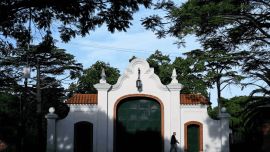The scandal in the Human Capital Ministry has several layers. Government infighting, administrative difficulties and possible corruption have become installed in the local media since portfolio chief Sandra Pettovello decided to throw out her Childhood, Adolescence & Family secretary Pablo de la Torre.
As an indirect consequence, the complex fabric of La Libertad Avanza (LLA) has been exposed. And it includes little-known elements of traditional politics, such as Frente Joven, an ultra-Catholic group which grew in profile during the bid to legalise abortion in Argentina. These days its militants are annoyed, feeling victims of an “operation” against them. They reject consultations from the press for allegedly irregular contracts with the Organisation of Ibero-American States (OEI, in its Spanish acronym). When asked where these “operations,” these “attacks” could come from, their followers respond with various options: “the lightweight Church,” “progressive Catholics” or “the resentful old right.”
To understand the place occupied by Frente Joven, it is necessary to briefly go over the scandal unfolding at the Human Capital Ministry. After Pettovello fired De la Torre, she sent the Anti-Corruption Office on May 30 a file to investigate OEI contracts which, according to the minister, had been “quickly” concluded by the now ex-official from beyond her portfolio. Over the weekend, the rumours multiplied, involving other LLA leaders in this alleged manoeuvre to administer “their own slush fund.” One of them is national deputy Santiago Santurio, whose name – as published by Clarín earlier this week – is circulating, together with La Libertad Avanza Buenos Aires provincial deputies Nahuel Sotelo and Agustín Romo.
Some media have branded them “the gang of Opus Dei,” but this association is incorrect. Saturio is a member of Frente Joven, which is often linked to the Fraternidad de Agrupaciones Santo Tomás de Aquino (FASTA) group, although its members insist that there are no formal ties. Sotelo is a fervent Catholic and conservative militant but he is not recognised as a FASTA member. “Opus Dei stands to the left of Nahuel,” joked somebody who knows him, speaking on condition of anonymity. Romo’s links to the group are, in reality, not so much religious as political – he comes from San Miguel, the turf of De la Torre, where his father is a municipal councillor for La Libertad Avanza.
The links between La Libertad Avanza and right-wing and radical Catholic sectors are very close. They were indeed one of the points in common between De la Torre and Pettovello, who has just teamed up with Abel Albino (from the Fundación Conin) to distribute foodstuffs held by the government at two warehouses.
Albino, an ultra-conservative paediatrician (who has publicly opposed, for example, the use of contraceptive methods), will continue to work with many of the Human Capital Ministry teams and in all the areas where Frente Joven has managed to set foot.
Inside government
Santurio maintains that the accusations regarding the OIE contracts are "ridiculous." The deputy is one of the best-known faces of Frente Joven.
His first steps in politics were taken in 2018, when he started frequenting Congress to provide deputies with information, hoping to convince them to vote against the first abortion bill then being debated. He has good links with Pettovello and, within her Human Capital Ministry, a very direct relation with Educación Secretary Carlos Torrendell, whose undersecretary for Legal and Administrative Coordination, Inés Brogin, is another member of the organisation.
As undersecretary for Family Policies within the Human Capital Ministry, De la Torre named one of his main confidants whose political origins are also in Frente Joven: Ana Belén Mármora, a young lawyer and journalist who both in 2018 and 2020 was the “spokeswoman” of the cause.
Belén Mármora is married to Agustín ‘El Chino’ Caulo, the current chairman of Frente Joven, whose appointment as Catholic Cult director within the Cults Secretariat under rancisco Sánchez, another ultra-Catholic and conservative leader, was published in the Official Gazette on June 3.
De la Torre’s link with Frente Joven is not organic but “natural” according to those who know him. When the group of Catholic militants decided to become involved in public life, San Miguel – the Greater Buenos Aires district where Joaquín de la Torre was mayor – became a sort of refuge and political base. Back then there were not so many leaders with a structural and territorial base who were militants in the “celeste” anti-abortion cause so that the association was obvious.
Yet far from being a group of naive youths who wanted to become involved in a cause they considered just, the construction of Frente Joven had a clear objective. Today, despite the unease produced by their organisation appearing mentioned in articles on the Human Capital Ministry scandal, they feel that they have gained elbow-room.
Besides Santurio, Caulo and Mármora, other militants have clinched government posts. Just to give a few examples: Belén Diez, the Communications director of the organisation, works with the deputy Omar de Marchi in Congress; Eros Facundo D’Amore, who directed a district of the Frente in Mendoza Province, advises PRO deputy Álvaro Martínez; Camila Duro, who took charge of training group volunteers , is now the Senate’s Parliamentary Training director; Ezequiel Chabay, who was a volunteer, has a Foreign Ministry post; and Sebastián Schuff, who was responsible for Institutional Relations, in April organised an event in the Chamber of Deputies with his NGO Global Center for Human Rights, which was attended by Martín Menem, Nicolás Mayoraz and Agustín Laje.
Celeste springboard
The political emergence of all these leaders is anchored in the first debate for the legalisation of abortion. At that time the most conservative sectors observed how the green tide was growing and began to meet. In those first meetings Frente Joven began to stand out. It was not the only movement but they showed that they had a superior political capacity to think up strategies, weave links and communicate. The group meant an opportunity for those who for over a decade had been looking for a change of generation in the Catholic right.
In the “celeste” universe there are those who single out Mariano Gervan – a former Senate pro-secretary for the PRO caucus and a veteran of Congress corridors – as one of the men behind the construction. According to this account, one day he met up with three youths from the organisation, among whom was Leandro Flocco, its chairman for the previous 12 years. Gervan, who in the last campaign worked behind the scenes with Carlos Kikuchi for La Libertad Avanza, “taught” them the art of politics.
“They were kids who had to get to know the legislators and know how to treat them,” recalls a person who knew them at that time.
Frente Joven, with a presence in Argentina’s largest provinces, created the Programme for Training Young Leaders, which still functions today. On its website it presents three more bills: “The right to a future” in which they defend “everybody’s right to live”; “Defenders of mums” who work on “containing women with pregnancies at risk and their children being born into low-income neighbourhoods”; and “The growth project” dedicated to the educational development of children in vulnerable situations.
At the first meetings of what would afterwards be the “celeste” universe, anybody ready to demonstrate against abortion was invited. Not everybody shares the same memories of the youth.
“I was surprised by their level of ambition. It was disproportionate. That is why their rapid ascent does not surprise me. They pushed aside us older folk, who had helped them to win a place, as soon as they had the chance,” complains somebody who subsequently left the group. “I went to a couple of their meetings but left in shock. Their positions are extreme,” added a woman with links to the Catholic Church. Both spoke on condition of anonymity.
Soon, members had worked out how to organise and stage rallies and to draw the attention of the leadership. They celebrated the first rejection of the abortion bill as their triumph and continued with political construction. This current of the “celeste” movement seems to be the one which imposed itself on La Libertad Avanza, as confirmed by President Milei’s appointment of Sánchez as Cults secretary. At the summit hosted by the far-right Vox party in Madrid, for example, the official expressed himself publicly against abortion but also questioned Cristina Fernández de Kirchner for promoting gay marriage and even Raúl Alfonsín for pushing the debate on divorce.
Secretary Sánchez does not belong to Frente Joven but he shares their vision of the world. At some point the name of Santurio was floated for the post but then the deputy promoted Caulo. He had no means of winning the tussle: Sánchez, a man of Patricia Bullrich and a PRO operator in Neuquén, became very friendly with Javier Milei and Victoria Villarruel in Congress between 2021 and 2023, winning their confidence. Yet the official is not known to the religious world and accumulates controversies. That is why there are those who maintain that in this department’s concrete and institutional links, it is Caulo who calls the shots
Prior to the exit of De la Torre, at least, some officials of the Human Capital Ministry, including Pettovello, used to walk the two-and-a-half blocks separating the Casa Patria Libertad (housing their portfolio) from the Foreign Ministry (out of which the Cults Secretariat works). The teams moved as if they worked together.
It remains to be seen what will happen to those links following the latest scandal. Together with Sánchez and Caulo, for example, Tomás Rendle works as chief advisor. He supported De la Torre after his dismissal, retweeting messages on social media.
Ideologically aligned with Frente Joven, Sánchez and the most conservative wing of the government, Rendle was part of the group which travelled to Spain with Milei last month, participating in a Centro de Derechos Fundamentales meeting with Sánchez, deputies Santurio and Mayoraz and lawyer Santiago Muzio. As published by the institution in its X social network account, "the election of Milei has breathed hope into all the Western conservative movement."
“They are young people with ideals who are making a difference,” assured one man who knew them in 2018 and who remains in contact with the group’s leaders. He was indignant with Frente Joven’s critics: “They always bash them for being religious. What do they want, that we Catholics stay at home?”






















Comments